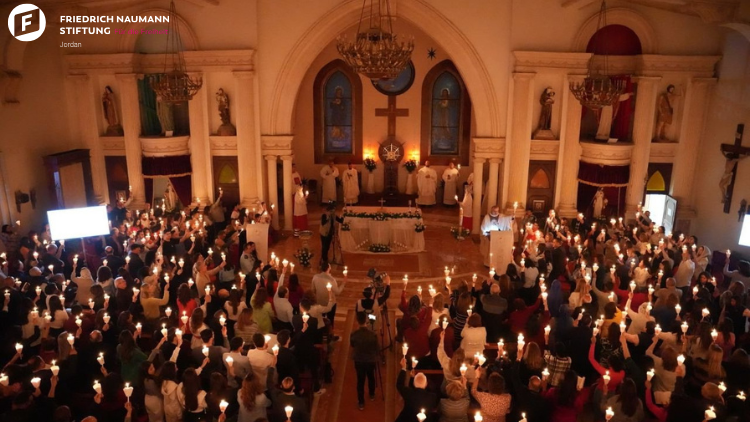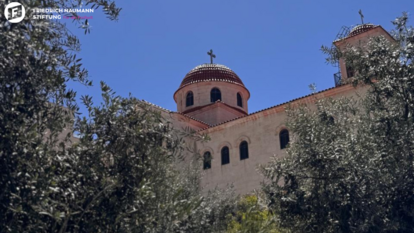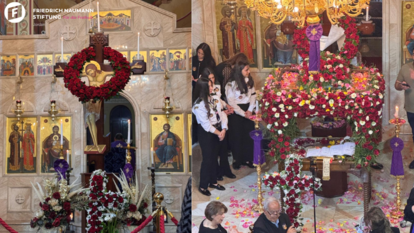Easter in Jordan
Christian Traditions in a Muslim-Majority Land

Worshippers hold candles during Easter Mass in the Jordanian capital Amman, April 16, 2023.
© (OSV News photo)When people think of Jordan, they often picture mosques and Islamic traditions. Yet, Christianity has deep roots in the Kingdom, and today, Christians continue to play a vital role in its cultural and social life. This article aims to provide insights into religious freedom in Jordan, the presence of Christianity, and the unique ways Easter is celebrated by the country’s Christian communities—highlighting a spirit of unity, faith, and coexistence.
Religious Freedom as a Core Principle of Liberalism
The concept of religious freedom has always been deeply rooted in the thoughts of early liberal thinkers. As early as the 17th century, the British philosopher John Locke argued for the separation of church and state, advocating for religious tolerance and the protection of individual liberty in matters of faith. Locke believed that genuine faith could not be imposed by force; rather, it must be the product of free and personal conviction.
In the 19th century, philosopher John Stuart Mill emphasized the importance of individual autonomy and the free expression of thought, including religious belief in his work “On Liberty”.
He stated: “The state is not justified in imposing moral or religious orthodoxy, and it has no right to interfere with individuals' private religious beliefs, so long as these do not harm others”.
For Mill, individual liberty and autonomy are crucial to a just society. People must be free to express their beliefs, even if those beliefs are mistaken since society benefits from open dialogue and the ability to challenge beliefs. Furthermore, Mill believed that no individual or group should have a monopoly on truth, because human beings are fallible, even beliefs that are widely accepted may be false.
Christianity in Jordan: A Deep-Rooted Presence
The early spread of Christianity in the Levant is well-documented in both religious and historical records, with several key biblical sites located within Jordan’s borders—most notably Bethany Beyond the Jordan, believed to be the site of Jesus' baptism by John the Baptist, and Mount Nebo, where Moses is said to have viewed the Promised Land. Under Roman and Byzantine rule, Christianity flourished across the region. The remains of ancient churches—many dating back to the 4th to 7th centuries—can still be found in cities like Madaba, Umm Qais, and Jerash.
Today, Christians in Jordan make up a small but visible minority—estimated at around 2–4% of the population. The majority belong to the Greek Orthodox Church, with other denominations including Roman Catholics, Armenian Orthodox, and various Protestant communities.
The Jordanian constitution guarantees a relatively high degree of religious freedom compared to other countries in the region. Even though Article 2 of the Jordanian Constitution states: “Islam is the religion of the State and Arabic is its official language”, the Christian community in Jordan is protected by the latter. Article 14 explicitly emphasizes the freedom of religion: "The State shall safeguard the free exercise of all forms of worship and religious rites in accordance with the customs observed in the Kingdom, unless such is inconsistent with public order or morality."
In practice, Christian communities in Jordan enjoy a degree of autonomy, operating their religious courts for personal status issues and maintaining a wide network of churches, schools, and charitable institutions that serve both their members and the broader society. They also participate in political life, with guaranteed parliamentary seats and representation in municipal councils. Despite being a minority, Jordanian Christians play a prominent role in the country’s cultural, economic, and educational sectors.

The Church of Saints Constantine and Helena in Amman, Jordan. Nestled amongst olive trees, the church stands as a symbol of Jordan’s deep-rooted Christian heritage and enduring religious coexistence.
© Photo credit: Gloria Al-KhalasaIn the Spirit of Easter: Unity and Faith among Christians
Easter holds profound significance for Christians worldwide, commemorating the resurrection of Jesus Christ. In Jordan, this sacred occasion is marked by unique traditions that not only celebrate faith but also exemplify the unity and harmony amongst the diverse Christian denominations within the Kingdom.
Historically, different Christian denominations have observed Easter on separate dates due to variations between the Gregorian and Julian calendars. However, nearly half a century ago, Christian communities in Jordan agreed to celebrate Easter simultaneously, following the Eastern Julian calendar. This decision was made to foster unity amongst Catholics, Orthodox, and Protestants, allowing them to commemorate the resurrection of Christ together.
The Holy Week commences with Palm Sunday, a day that holds special significance in Jordan. Churches across the Kingdom are filled with worshippers who participate in festive ceremonies, raising olive branches, palm fronds, and candles while singing hymns specific to the occasion.

On April 13, the Christian community gathered at the Church of Saints Constantine and Helena in Amman to celebrate Palm Sunday with song, prayer, and tradition—showing once again how faith and unity thrive in Jordan.
© Photo credit: Gloria Al-Khalasa
On Good Friday, many parishes in Jordan organize mass cross processions through the towns and streets, with believers carrying the Holy Cross, singing, and commemorating the crucifixion and death of Christ. For instance, in the city of Fuheis, the Greek Orthodox, Melkite Roman Catholic, and Latin churches hold the Way of the Cross prayer. This event draws a large number of believers from the city and beyond, exemplifying the unity amongst different Christian communities.

Good Friday service at the Church of Saints Constantine and Helena, Amman, April 18, 2025. The solemn rituals included the veneration of the cross and the Epitaphios procession, adorned with flowers and prayers, marking the crucifixion and burial of Christ.
© Photo credit: Gloria Al-KhalasaJordan's commitment to religious harmony is further exemplified by acts of interfaith solidarity during Easter. In recent years, young Muslims across Jordan have stood guard to protect churches on Easter Sunday, ensuring that Christians could celebrate the resurrection of Jesus Christ in peace. This gesture underscores the mutual respect and coexistence that characterizes Jordanian society. The government also recognizes the importance of these celebrations by declaring holidays for Christians working in public institutions during Palm Sunday and Easter, allowing them to observe their religious rites fully.
In essence, Easter in Jordan transcends mere religious observance; it embodies the spirit of unity, faith, and mutual respect amongst the Kingdom's diverse communities.
